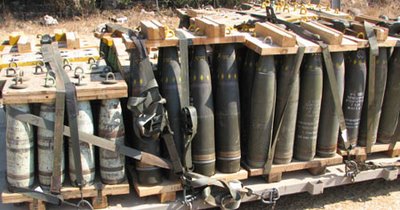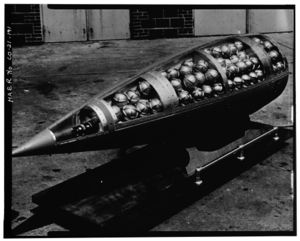They come in clusters...
a cluster bomb...
...and its devastating result
1) What is a cluster bomb?
Cluster munitions are air-dropped or ground launched shells that eject multiple small submunitions (bomblets). Their primary purpose is to kill enemy soldiers.
2) What is the law on cluster munitions?
Although covered by the general rules of international humanitarian law, cluster munitions are not currently covered by any specific international legal instrument. So far Belgium is the only country to have issued a ban on the use (carrying), transportation, export, stockpiling, trade and production of cluster munitions. However, several countries, including Austria, Australia, Denmark, France, Germany, Norway, Sweden and Switzerland have seen considerable parliamentary activity on cluster munitions. In some of these countries, there are ongoing discussions concerning draft legislation banning cluster munitions, along the lines of the legislation adopted in Belgium. Norway has also committed itself to an international ban on cluster munitions and recently announced a moratorium on the weapon.
"It's not illegal to use against soldiers or your enemy, but according to Geneva Conventions it's illegal to use them (cluster bombs) in civilian areas," said Dalya Farran, spokeswoman for the UN Mine Action Coordination Center, which has an office in the southern port city of Tyre. "But it's not up to us to decide if it's illegal - I'm just giving facts and letting others do analysis."
3) Did the IDF use cluster munitions in Lebanon?
"We've heard the allegations that these munitions were used in Lebanon and we're looking into it," a state department spokesman said yesterday. The Israel Defence Forces (IDF) has previously bought M-26 rockets and US-made cluster artillery shells, and CBU-26 aerial bombs. Bomblets from all three have been found by UN investigators in southern Lebanon. The IDF said all weapons used were "legal under international law and their use conforms with international standards".

Pallets of 155mm artillery projectiles including DPICM cluster munitions (center and right with yellow diamonds) in the arsenal of an IDF artillery unit on July 23 in northern Israel. Each DPICM shell contains 88 sub-munitions, which have a dud rate of up to 14 percent. © Human Rights Watch 2006
Thousands of cluster munitions cover the grounds of Lebanon especially south of the Littani river. Each of the submunitions has the power of an antipersonnel land mine upon detonation. Twelve civilians have been killed and fifty injured since the cease fire from unexploded cluster submunitions. Sadly, more lay in wait for innocent Lebanese children...




2 Comments:
I am not sure the investigation will lead to anything.
it's been happening for decades unfortunately.
what a terrible picture mr n
Post a Comment
<< Home